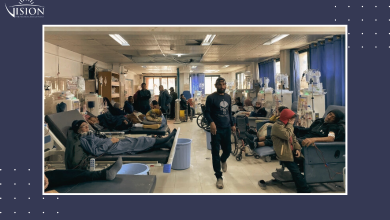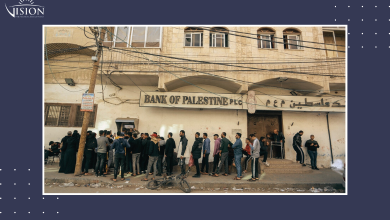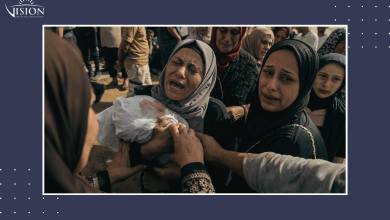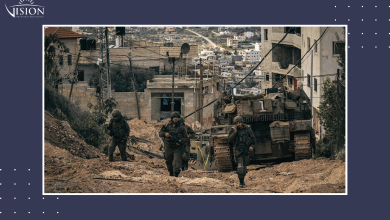The Escalating Pace of Demolitions in Jerusalem: Causes and Consequences
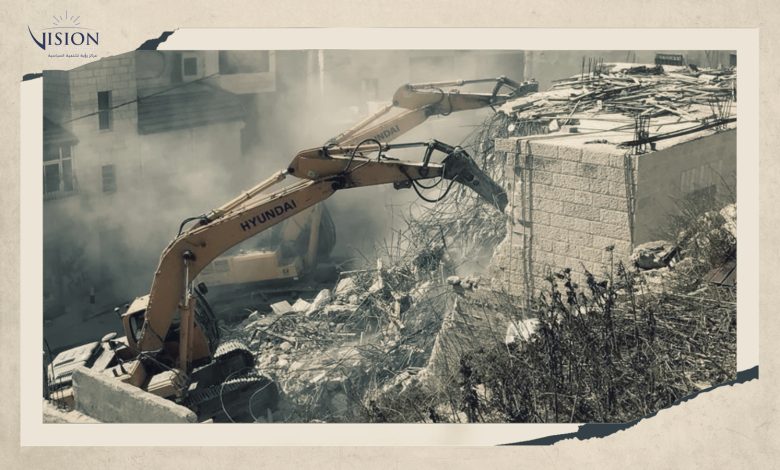
Hamdi Hussein[1]
Since the beginning of 2023, the demolitions of Palestinian homes in the city of Jerusalem have seen a rapid escalation, coinciding with changes in the corridors of “Israeli” governance in favor of the far-right tendencies. This increase in demolitions is attributed to various factors, the most prominent of which is the current government’s policy of extreme aggression towards Palestinians in Jerusalem.
This report discusses the reality of frequent demolitions in Jerusalem. It highlights the consequences of these procedures against the Palestinians in Jerusalem on one hand, and the broader Palestinian struggle on the other, while shedding light on the Israeli justifications for demolitions, methods of implementation, and the positions of the far-right Israeli government as well as the Palestinian Authority.
Statistical Background on Demolitions:
Statistics have shown an escalation in the demolitions carried out by the occupation in the neighborhoods of the occupied Jerusalem since the beginning of 2023, targeting Palestinian homes and facilities. In January, the total number of demolitions outside the Separation Wall boundaries in the neighborhoods adjacent to the city reached nearly 39 buildings and a single facility, including one house. Meanwhile, within the neighborhoods of the city belonging to the occupation municipality, the number of demolished buildings and facilities reached approximately 21, including 14 residential buildings, resulting in the displacement of 31 Palestinians from their homes.
| Type of Building | Number | Palestinians Lost Homes | Demolitions | Self-Demolitions |
| Residential Buildings | 14 | 31 | 6 | 8 |
| Non-Residential Buildings | 7 | 0 | 5 | 2 |
Furthermore, during February, 37 demolitions in the Jerusalem governorate were reported, of which 11 were coercive self-demolitions. The demolitions targeted inhabited houses, as well as those under construction, agricultural, animal and commercial facilities. Additionally, the occupying authorities also carried out land leveling and the demolition of retaining walls.
In 2022, the Palestinian Central Bureau of Statistics recorded approximately 128 cases of demolitions of residential buildings and 176 facilities in the Jerusalem Governorate. Additionally, in the same year, Beit Selim recorded 151 cases of demolitions within the neighborhoods of Jerusalem, of which 84 were demolitions of Palestinian homes, leaving 286 Palestinians homeless, and 67 were non-residential buildings. In the adjacent neighborhoods of the Jerusalem Governorate located outside the Separation Wall, 134 cases of demolitions were reported, including 23 homes where 60 Palestinians were left homeless, in Addition to 111 non-residential buildings.
| Type of Building | Number | Palestinians Lost Homes | Demolitions | Self-Demolitions |
| Residential Buildings | 84 | 286 | 32 | 52 |
| Non-Residential Buildings | 67 | 0 | 56 | 11 |
The Means and Implementers of Demolitions:
Israel began its policy of demolitions in the neighborhoods of Jerusalem since occupying the city in 1967. This policy aims to suffocate the Palestinians and prevent the expansion of neighborhoods as a part of the ongoing policy of coercive displacement pursued by the occupation against the Palestinians. As of late 2021, more than 2146 Palestinian homes, in addition to other non-residential and commercial establishment were demolished.
The demolition operations are often associated with the legalization of building permits, which are prohibited by the occupying authorities. Despite the fact that the majority of operations take place in the heart of Palestinian neighborhoods, the operations do not only target residential buildings, but also extend to the demolition of commercial establishments, workshops, Bedouin encampments, and livestock sheds.
The occupying authorities classify the reasons for demolition into four categories:
1- Military demolition: which is carried out Jerusalem and in the “Area C” by the army under the pretext of protecting settlers.
2- Punitive demolition: in which “Israel” seeks to impose collective punishment on Palestinian families from which resistance fighters emerge to carry out armed attacks against Israeli targets.
3- Administrative demolition: it is the most common in the neighborhoods of Jerusalem, where “Israel” deliberately conducts demolitions using the pretext of permit unavailability, as an implementation of the decision of the mayor of Jerusalem.
4- Judicial demolition: which is executed subsequent to an order made by Israeli courts for the purpose of demolition. The occupation also approved the “Kaminitz Law” in late 2017, which sets hard conditions for postponing demolition orders for “unlicensed” homes.
Moreover, the occupation also forces Palestinians to bear the high costs of demolitions, which pushes many of them to carry out self-demolition. Since 2006 until late 2021, more than 550 coercive self-demolition operations have been recorded in the city of Jerusalem.
The Impact of the Far-Right Government on the Demolitions in Jerusalem:
Official Israeli attitudes over the procedures are divided regarding the pace and timing of the operations. While leaders, such as Netanyahu prefer to continue the operations with the usual pace and timing, Israeli Minister of Internal Security, Itamar Ben-Gvir, seeks an increase in the frequency.
Ben-Gvir called for the demolition of a residential building in Wadi Qadoum in Silwan, which housed 14 Palestinian families (90 people), in response to a Palestinian armed attack, and under the justification that the building was “unlicensed”. In the same context, Netanyahu rejected American and European diplomatic pressure to prevent this demolition. Meanwhile, police inspector Yaakov Shapitai viewed the demolition at this frequency as unfeasible under the operational constraints of the police.
Nonetheless, Ben-Gvir has insisted on the continuation of demolitions even during the holy month of Ramadan, contrary to Israeli orientation to postpone operations until the end of Ramadan in recent years. That led the Police inspector to accuse Ben-Gvir of the intervention of police work. Additionally, former police leaders called for Ben-Gvir’s removal after the decisions to continue the operations during Ramadan, as his procedures may ignite a new Intifada.
The Palestinian Reactions:
The Palestinian Ministry of Foreign Affairs has condemneded the ongoing demolitions and called on the international community to assume its responsibilities and implement the International Legitimacy Resolutions, considering that as crimes aimed at ethnic cleansing and forced displacement of Palestinians in the city, and imputing responsibility to the Israeli government while emphasizing that “ceasing all unilateral and illegal measures is the gateway to commitment to the Aqaba understandings”. Meanwhile, the Governorate of Jerusalem considered that “as a war crime” calling on the European Union to exert pressure on the Israeli government.
Palestinian factions in Gaza confirmed that the occupation will not achieve its goals to subjugates the Palestinians: Fatah emphasized that Palestinians will continue their journey towards statehood and independence, viewing the Israeli violations as obstacles to achieve the security and stability.
Hamas, stated that the demolition of the homes of martyrs will not break the courage of the Palestinian youth who resist the occupation. Meanwhile, the Popular Front for the Liberation of Palestine emphasized the necessity of taking the file of violations to the international forums and called on boycotting, divesting, and sanctioning the occupation.
The Implications of Increasing Demolition Rates:
First: this poses an existential threat to the Palestinians who number up to 366,000 in Jerusalem and its neighborhoods, specifically in Jabal al-Mukaber, where the occupying forces plan to demolish 800 Palestinian buildings in exchange for constructing 500 “Israeli” housing units and commercial outlets. The same threat also applies to Jabal al-Zaytoun (Mount of Olives), where the Israelis seek to implement the National Gardens project, and to Silwan, which is claimed to be built on the ruins of “David’s City”, aiming to establish “Torah Gardens”.
Additionally, there is a plan to establish an aerial train linking East and West Jerusalem, passing through Wadi al-Rababah and Wadi Hulweh. Furthermore, the increase in demolition will include other areas such as the town of Shuafat and its camp, the village of Sur Baher, Wadi Hamza, Beit Hanina, Beit Safafa, Ras Al-Amud, and others. This comes as part of efforts to Judaise the city and its neighborhoods, and to guarantee a demographic distribution in favor of Jews. Consequently, young Jerusalemites face increasing obstacles to marriage and building, which may lead to their displacement from the city’s neighborhoods.
Second: the implementation of the Greater Jerusalem project involves targeting Palestinian neighborhoods and villages situated outside the Separation Wall, preventing Palestinians from expanding or building in vacant spaces. This is intended to connect settlements near the city with the settlement blocs of Giv’at Ze’ev/Ja’afon, Ma’ale Adumim, and Gush Etzion, all of which are encompassed in this plan, along with small settlements within this geographic area. This is always accompanied by restrictions imposed on the Palestinian villages around the included areas in the project.
| Area | Residential Buildings | Non-Residential Buildings | Settlement |
| Jieb | 0 | 7 | Giv’at Ze’ev/Ja’afon |
| Khalalylah Distrikt | 0 | 10 | Giv’at Ze’ev/Ja’afon |
| Ram | 0 | 3 | Atarot |
| Zaim | 1 | 25 | Ma’ale Adumim & Mishor Adumim |
| Eastern Sawahra | 2 | 6 | Ma’ale Adumim & Mishor Adumim |
| Jaba’ | 6 | 14 | Adam |
| Hizma | 0 | 6 | Bisgat Ze’ev |
| Anata | 14 | 26 | Tisfon Yurshalym & Ma’ale Adumim |
| Qalandia | 0 | 14 | Atarot |
Thirdly, the Palestinian arena is at risk of being inflamed Due to the violations in Jerusalem, where the ongoing trend towards carrying out demolitions could lead to accumulations that may ignite the Palestinian arena, as happened in 2021, starting from the Sheikh Jarrah neighborhood. The discourse surrounding demolition operations is getting increased among the Palestinians amid direct Israeli insistence on liquidating the Palestinian presence and imposing collective punishment.
Conclusion:
Demolitions constitute one of the most pressing concerns for the Palestinians in Jerusalem, particularly in light of the extreme right-wing’s decision-makers. This is coupled with the occupation’s efforts to isolate Jerusalemites from the rest of the Palestinian, which makes up a threat to the Palestinian unity.
[1] The researcher holds two Master’s degrees, one in Public Policy from the Doha Institute for Graduate Studies in Qatar, and the other in International Studies from Birzeit University in Palestine. He has published several papers and research studies.


